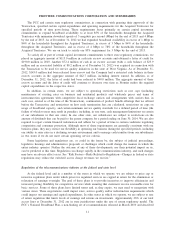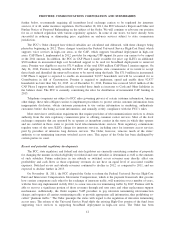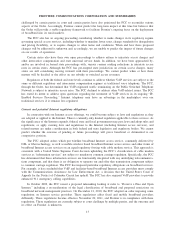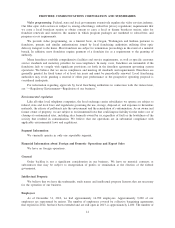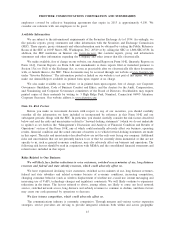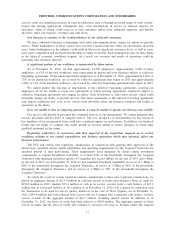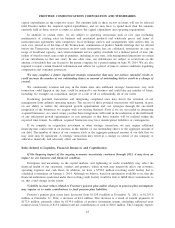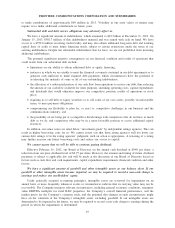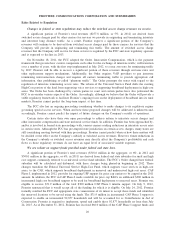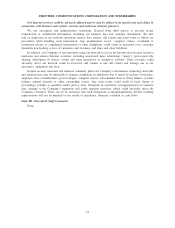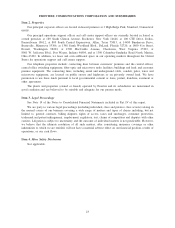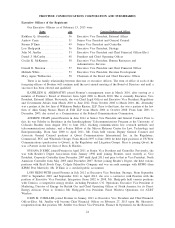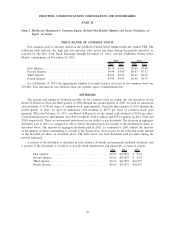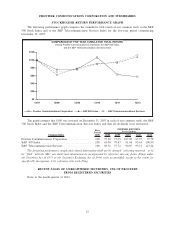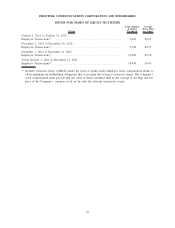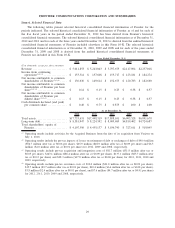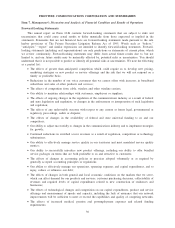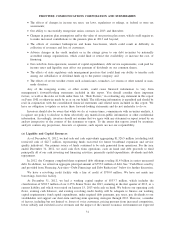Frontier Communications 2012 Annual Report Download - page 22
Download and view the complete annual report
Please find page 22 of the 2012 Frontier Communications annual report below. You can navigate through the pages in the report by either clicking on the pages listed below, or by using the keyword search tool below to find specific information within the annual report.has recorded increases to Cash and Other liabilities in the balance sheet. The FCC is currently considering the
rules for distribution of incremental CAF funding in 2013.
Federal subsidies representing interstate access support, high cost loop support and local switching support
represented $160.7 million, or 3%, of Frontier’s total revenues in 2012 and $154.0 million, or 3%, of Frontier’s
total revenues in 2011. State subsidies represented $38.2 million, or 1%, of Frontier’s total revenues in 2012
and $41.6 million, or 1%, in 2011. Surcharges to customers (local, long distance and interconnection) to
recover universal service fund contribution fees which are remitted to the FCC and recorded as an expense in
“Other operating expenses”, represented $119.7 million, or 2%, of Frontier’s total revenues in 2012 and $104.5
million, or 2%, in 2011.
Our Company and our industry will likely remain highly regulated, and we could incur substantial
compliance costs that could constrain our ability to compete in our target markets.
As an incumbent local exchange carrier, some of the services we offer are subject to significant regulation
from federal, state and local authorities. This regulation could impact our ability to change our rates, especially
on our basic voice services and our access rates, and could impose substantial compliance costs on us.
Regulation could constrain our ability to compete and, in some jurisdictions, may restrict our ability to expand
our service offerings. In addition, changes to the regulations that govern our business (including any
implementation of the Order) may have an adverse effect on our business by reducing the allowable fees that
we may charge, imposing additional compliance costs, reducing the amount of subsidies or otherwise changing
the nature of our operations and the competition in our industry. At this time it is unknown how these
regulations will affect Frontier’s operations or ability to compete in the future. This and other FCC rulemakings
and state regulatory proceedings, including those relating to intercarrier compensation, universal service and
broadband services, could have a substantial adverse impact on our operations.
In addition, in connection with our Internet access offerings, we could become subject to laws and
regulations as they are adopted or applied to the Internet. There is currently only limited regulation applicable
to these services. As the significance of the Internet expands, federal, state and local governments may pass
laws and adopt rules and regulations, or apply existing laws and regulations to the Internet (including Internet
access services), and related matters are under consideration in both federal and state legislative and regulatory
bodies. We cannot predict whether the outcome of pending or future proceedings will prove beneficial or
detrimental to our competitive position.
We may not be able to deploy the unserved locations with the CAF funds received.
During 2012 and early 2013, we received $71.9 million from the CAF, which supports broadband
deployment in high-cost areas. If Frontier is unable to deploy to the 92,877 unserved locations with the CAF
funds received to date in accordance with the FCC rules by July 2015, then the Company would need to incur
additional capital expenditures or refund a portion of the CAF received in 2012 to the FCC.
Risks Related to Technology
In the future, as competition intensifies within our markets, we may be unable to meet the technological
needs or expectations of our customers, and may lose customers as a result.
The communications industry is subject to significant changes in technology. If we do not replace or
upgrade technology and equipment, we may be unable to compete effectively because we will not be able to
meet the needs or expectations of our customers. Replacing or upgrading our infrastructure could result in
significant capital expenditures.
In addition, rapidly changing technology, enhancements to product offerings and the management of
broadband speed and capacity issues may influence our customers to consider other service providers, like
cable operators or wireless providers. We may be unable to attract or retain new customers from cable
companies due to their deployment of enhanced broadband and VoIP technology. In addition, new capacity
services for wireless broadband technologies may permit our competitors to offer broadband data services to
our customers throughout most or all of our service areas.
21
FRONTIER COMMUNICATIONS CORPORATION AND SUBSIDIARIES


